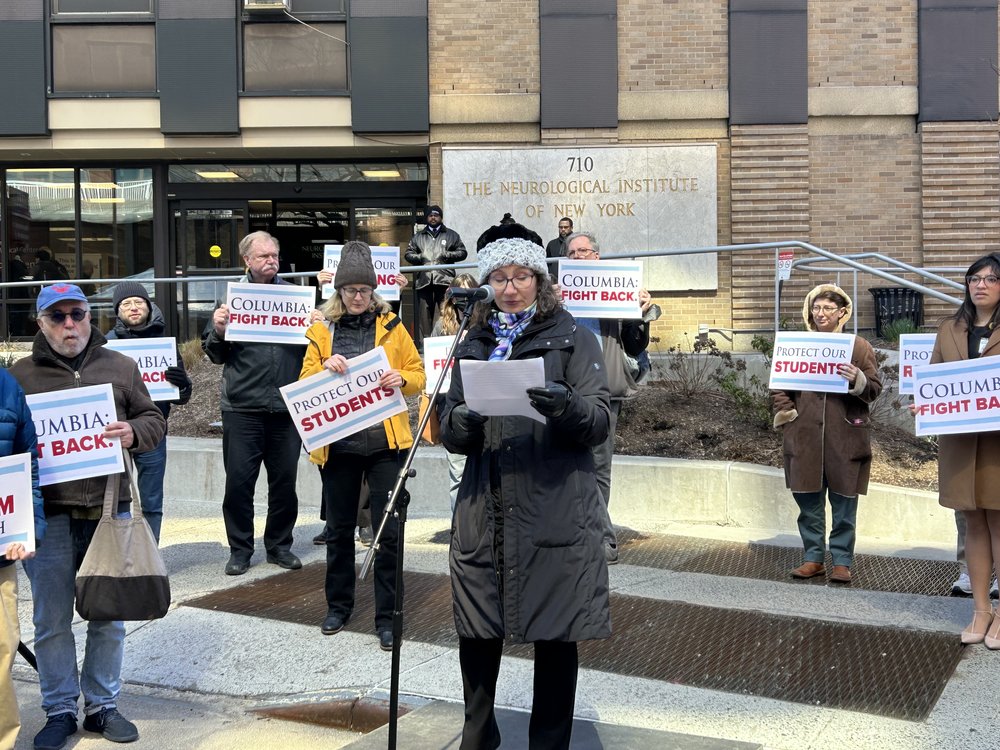Trump cuts include Columbia U. research into mold at NYCHA, Bronx air quality
April 4, 2025, 2:17 p.m.
A government document details the numerous research projects on the chopping block, from research into local health to projects on cancer and Alzheimer’s.

The Trump administration’s freeze on federal grants to Columbia University has imperiled research projects dedicated to improving the health of local New Yorkers.
According to a Health and Human Services document shared with Gothamist, the Trump administration has canceled funds for local projects that include a Columbia partnership with community hospitals to prevent maternal fatalities during childbirth, research into mold in New York City’s public housing and monitoring air pollution in the Bronx, among many others.
It wasn’t clear which of the grants were canceled because of the Trump administration’s move to withhold $400 million in federal funds to Columbia University for its alleged failure to combat antisemitism, or as part of the across-the-board federal slashing of funds for science. The nearly 200 projects listed in the unofficial tally also included research into cancer and Alzheimer’s disease.
“What we are experiencing now is an attack on the independence of higher education, indeed on the future of science in America, under the guise of fighting antisemitism. And we won't be fooled,” Melanie Wall, a professor of biostatistics at the university’s Mailman School of Public Health, said at a protest. ”We will not be held hostage.”
The project evaluating mold levels and asthma rates in NYCHA aimed to identify the types of buildings most prone to the toxic spores, and included a review of the efficacy of the city’s “Mold Busters” remediation project. Toxic mold has plagued the city’s public housing for decades, contributing to high asthma rates. A class-action lawsuit from residents led to a consent decree requiring court oversight of the authority, which houses some 450,000 New Yorkers. A spokesperson from NYCHA said the agency had not yet been informed of the grant's cancellation.
The maternal health initiative was supposed to study health disparities and fight deaths among mothers during childbirth in New York. Funding for The New York Obesity Nutrition Research Center was supposed to go to obesity and diabetes research and treatment. And a federal grant would have supported a summer training program for Bronx high school students focusing on engineering and environmental justice.
Representatives for the Health and Human Services department did not respond to an inquiry. Researchers on the local projects also did not respond.
Last month, federal officials announced they were withholding $400 million at Columbia, alleging the university “failed to address relentless violence, intimidation and antisemitic harassment” on campus.
The Trump administration then outlined its demands, including a mask ban, tighter rules on protests, giving university police arrest powers, and placing the Middle Eastern, South Asian and African studies under receivership, among others.
Last month, the university announced it had agreed to some of those demands: barring masks used to conceal identities during unauthorized demonstrations, adding 36 officers with arrest powers, and initiating a review of all regional studies programs, starting with the Middle East studies department.
Former interim president Katrina Armstrong wrote to the Columbia community that the university continues to be “guided by our values, putting academic freedom, free expression, open inquiry, and respect for all at the fore of every decision we make.”
A week after that letter, she was replaced as interim president by board of trustees co-chair and former journalist Claire Shipman.
A spokesperson for the university did not immediately respond to questions.
In a series of protests last week, faculty and students railed against the university’s concessions.
They said that the consequences of pulling funds from scientific research would have large and lasting effects on public health.
“ Medical miracles don't happen overnight. They take years. And they aren't cheap,” said Dr. Andrew Moran, an internal medicine physician and associate professor at Columbia. “You won't notice it tomorrow. You may not notice it for a few months. But someday soon, you or a family member will be diagnosed with cancer, dementia, or some other terrifying disease, but this time there will be no miracle cure because there is no funding.”
Columbia bows to Trump administration, hoping to restore federal funding